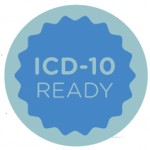The ICD-10 page on the Centers for Medicare & Medicaid Services (CMS) website features a countdown clock that shows the time left until Oct. 1, 2015, the date on which compliance with the new code set becomes mandatory. By the time this issue goes to press, the clock will read 90 or fewer days.
Time feels as though it has been perpetually counting down to ICD-10—the International Classification of Diseases, Tenth Revision—but the clock is actually running out now. After the initial decision to switch in 2009 and two yearlong delays, Oct. 1, 2015, now marks the official go-live date for the significantly revised and expanded coding language.
As with any major process change, ICD-10 comes with both benefits and challenges. On the plus side, ICD-10 carries the potential for increased international collaboration, the collection of more detailed health data and more precise documentation of the patient experience. Ultimately, this should lead to better analysis of disease and its progression, facilitate better quality of care and improve treatment outcomes. It’s also expected to contribute to epidemiological research and population health management.

Dr. King
“We’ll get a lot more granular data about what’s happening to our patients … such as a fracture from a car accident when the patient wasn’t wearing a seatbelt,” says Charles King II, MD, North Mississippi Health Services, Tupelo, Miss., and an ACR Board Member. “We’ll get information about quality, so third-party payers are going to use the data with these specific codes to figure out if they’re paying claims correctly. It’ll allow more robust data collection. We’re going to understand the causality of diseases and injuries to a much more in-depth degree.”
On the flip side, the challenges inherent with the switch include the significantly increased scope, technical difficulties, training needs and financial risks, and these issues are projected to be unevenly experienced by physicians who work in hospital systems, multispecialty groups and smaller private practices. Despite the varying level of complications, one truth is clear—the switch is not optional, and the time is now to make sure everything’s in place when the clock runs out in October.
The Timeline So Far
ICD-10 codes must be used on all HIPAA transactions, including both outpatient claims with dates of service and inpatient claims with dates of discharge of Oct. 1, 2015, and beyond. The penalty for submitting claims and other transactions with outdated codes is that they may be rejected and need to be resubmitted, which could result in delays and affect reimbursements.

